

Creationism. Day-age creationism. Day-age creationism, a type of old Earth creationism, is an interpretation of the creation accounts in Genesis.
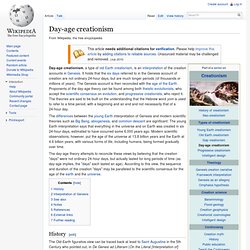
It holds that the six days referred to in the Genesis account of creation are not ordinary 24-hour days, but are much longer periods (of thousands or millions of years). The Genesis account is then reconciled with the age of the Earth. Proponents of the day-age theory can be found among both theistic evolutionists, who accept the scientific consensus on evolution, and progressive creationists, who reject it.
The theories are said to be built on the understanding that the Hebrew word yom is used to refer to a time period, with a beginning and an end and not necessarily that of a 24-hour day. The differences between the young Earth interpretation of Genesis and modern scientific theories such as Big Bang, abiogenesis, and common descent are significant. History[edit] American geologist and seminarian George Frederick Wright was originally a leading Christian Darwinist. Famous Creationists. Hauptseite – SchöpfungsWiki, der Enzyklopädie der Schöpfungswissenschaft.
Ausgewählte Artikel Zellbiologie.
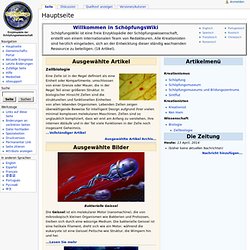
What were the initial Christian responses to Darwin? In a Nutshell Even before Darwin published The Origin of Species in 1859, many Christians had already accepted an old Earth.
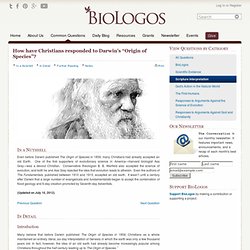
One of the first supporters of evolutionary science in America—Harvard biologist Asa Gray—was a devout Christian. Conservative theologian B. B. Council of Europe Parliamentary Assembly. About the museum. Answers in Genesis - Creation, Evolution, Christian Apologetics. Discovery Institute. Kreationismus. Spielarten des Kreationismus Kreationisten lehnen die Kosmologie (Urknall-Theorie), den Darwinismus und die Evolutionstheorie ab, denn sie sind überzeugt, dass das Leben auf der Erde nicht zufällig, sondern durch einen Schöpfungsakt entstand ("Creation Science"; Kreationsimus, von lateinisch creare = erschaffen).
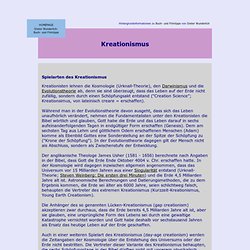
Während man in der Evolutionstheorie davon ausgeht, dass sich das Leben unaufhörlich verändert, nehmen die Fundamentalisten unter den Kreationisten die Bibel wörtlich und glauben, Gott habe die Erde und das Leben darauf in sechs aufeinanderfolgenden Tagen in endgültiger Form erschaffen (Genesis). Dem am sechsten Tag aus Lehm und göttlichem Odem erschaffenen Menschen (Adam) komme als Ebenbild Gottes eine Sonderstellung an der Spitze der Schöpfung zu ("Krone der Schöpfung").
In der Evolutionstheorie dagegen gilt der Mensch nicht als Abschluss, sondern als Zwischenstufe der Entwicklung. Kreationismus in den USA - Franziska Gerhardt. Geschichte des Kreationismus in den USA. History of creationism. The history of creationism relates to the history of thought based on the premise that the natural universe had a beginning, and came into being supernaturally.
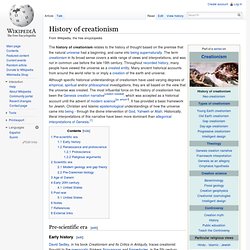
The term creationism in its broad sense covers a wide range of views and interpretations, and was not in common use before the late 19th century. Throughout recorded history, many people have viewed the universe as a created entity. Many ancient historical accounts from around the world refer to or imply a creation of the earth and universe. Although specific historical understandings of creationism have used varying degrees of empirical, spiritual and/or philosophical investigations, they are all based on the view that the universe was created.
The most influential force on the history of creationism has been the Genesis creation narrative[citation needed], which was accepted as a historical account until the advent of modern science[by whom?]. Pre-scientific era[edit] Early history[edit] St. Renaissance and protoscience[edit] Creationism. First published Sat Aug 30, 2003; substantive revision Mon Oct 29, 2007 At a broad level, a Creationist is someone who believes in a god who is absolute creator of heaven and earth, out of nothing, by an act of free will.
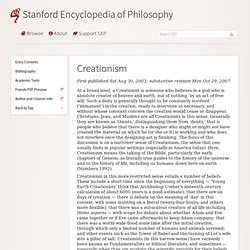
Such a deity is generally thought to be constantly involved (‘immanent’) in the creation, ready to intervene as necessary, and without whose constant concern the creation would cease or disappear. Christians, Jews, and Muslims are all Creationists in this sense. Generally they are known as ‘theists,’ distinguishing them from ‘deists,’ that is people who believe that there is a designer who might or might not have created the material on which he (or she or it) is working and who does not interfere once the designing act is finishing.
15 Answers to Creationist Nonsense. The Creation/Evolution Continuum. By Eugenie C.
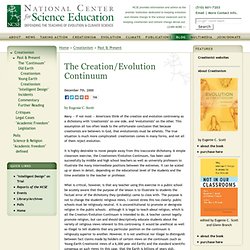
Scott Many — if not most — Americans think of the creation and evolution controversy as a dichotomy with "creationists" on one side, and "evolutionists" on the other. This assumption all too often leads to the unfortunate conclusion that because creationists are believers in God, that evolutionists must be atheists. The true situation is much more complicated: creationism comes in many forms, and not all of them reject evolution. It is highly desirable to move people away from this inaccurate dichotomy. What is critical, however, is that any teacher using this exercise in a public school be acutely aware that the purpose of the lesson is to illustrate to students the factual error of the dichotomy they (probably) came to class with. With this caveat in mind, then, teachers are encouraged to use the continuum exercise to educate students away from an erroneous dichotomous view of the relationship of creationism to evolution.
What is Creationism? Copyright © 2000-2002 [Article: May 30, 2000] [Links Updated: December 12, 2002] Contents espite many people's tendency to think of all creationists in one group and all evolutionists in another, "creationism" refers to a wide range of beliefs.
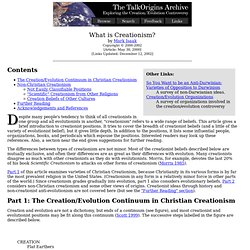
This article gives a brief introduction to creationist positions. Images.derstandard.at/20051012/Evolution-and-Creationism.pdf. How Creationism Works" Every religion in the world has its own version of the origins of life and matter.
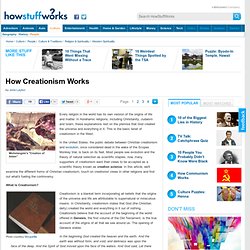
In Abrahamic religions, including Christianity, Judaism and Islam, these explanations rest on the premise that God created the universe and everything in it. ALL VIEWPOINTS: One Site. All Sides. Beliefs of the U.S. public about evolution and creation. About origins of life forms Menu Sponsored link.
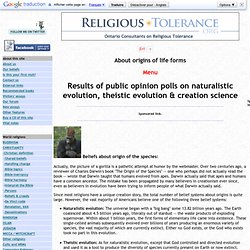
Why doesn't America believe in evolution? - life - 20 August 2006. Human beings, as we know them, developed from earlier species of animals: true or false? This simple question is splitting America apart, with a growing proportion thinking that we did not descend from an ancestral ape. A survey of 32 European countries, the US and Japan has revealed that only Turkey is less willing than the US to accept evolution as fact. Religious fundamentalism, bitter partisan politics and poor science education have all contributed to this denial of evolution in the US, says Jon Miller of Michigan State University in East Lansing, who conducted the survey with his colleagues.
'God allows the universe to create itself and evolve' From The Staff The evolution question: Where is God in creation? There are many answers to the question—Where is God in creation? —perhaps as many as there are people who ask it. And who doesn’t? It’s driven people to search the heavens, explore our Earth and plumb their souls. Related Web Sites. - Five Major Evolutionist Misconceptions about Evolution - Creationism History: Topic Index. Academics fight rise of creationism at universities. National Center for Science Education - Defending the Teaching of Evolution & Climate Science.
En español "Creationism" refers to the religious belief in a supernatural deity or force that intervenes, or has intervened, directly in the physical world. Within that broad scope, there are many varieties of creationist belief. Darwinism comes to America - Ronald L. Numbers. Creation and Evolution. Home Topics About Science & Faith Apologetics Archaeology & Anthropology Astronomy &/ Cosmology Bible & Science Creation&Evolution Education Environment Ethics Historical Studies Mathematics Origin of Life Philosophy Physical Science Psychology & Neuroscience Science & Technology Ministry Teaching & Research Worldview Whole-Person Education Youth Page Publications Articles Book Reviews Issues.
Antievolutionists and Creationists. The ‘Ordinary’ View of Creation. Evolution vs. creationism: an introduction - Eugenie Carol Scott. Creationism. Today, the American Scientific Affiliation, a prominent religious organisation in the United States, recognizes that there are different opinions among creationists on the method of creation, while acknowledging unity on the Abrahamic belief that God "created the universe.
"[7][8] Since the 1920s, literalist creationism in America has contested scientific theories, such as that of evolution,[9][10][11] which derive from natural observations of the universe and life. Literalist creationists[12] believe that evolution cannot adequately account for the history, diversity, and complexity of life on Earth.[13] Fundamentalist creationists of the Christian faith usually base their belief on a literal reading of the Genesis creation narrative.[12][14] Other religions have different deity-led creation myths,[note 1][15][16][17] while different members of individual faiths vary in their acceptance of scientific findings.
History[edit] Early and medieval times[edit] Republicans, Democrats Differ on Creationism. Four in 10 Americans Believe in Strict Creationism. Creationists fail in bid to offer 'science' degrees : Nature News.